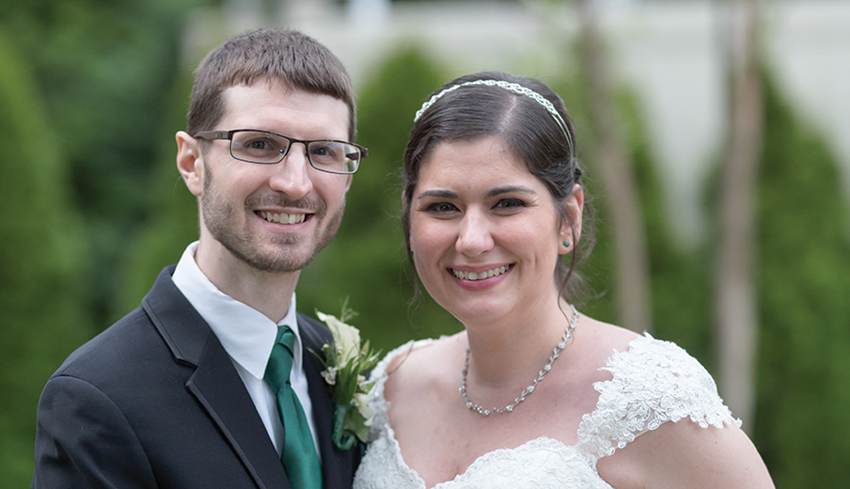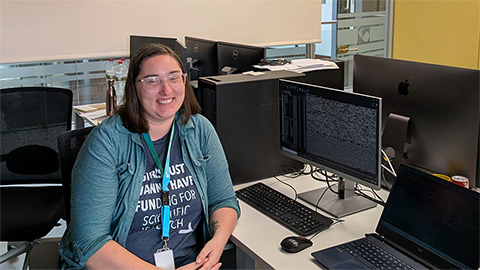I had my ‘crazy’ surgically removed
Every doctor must know how to deliver bad news. As a patient, your reaction is unpredictable. It depends heavily on the severity of the diagnosis; upon being told you have cancer, fear, dismay and even disbelief may battle for dominance in your mind. For the doctor, perhaps the most unexpected response to telling someone they have a serious illness is a simple “OK,” a nod and a moment of quiet thought. Even, secretly, a quiet sigh of relief.
About a year ago, this was my reaction when a skillful endocrinologist delivered the news. Luckily for me, my diagnosis was not as grave as cancer. I learned I had Cushing’s disease, essentially an intense overproduction of cortisol by my adrenal glands resulting from a tiny noncancerous tumor pressing on my barely larger pituitary gland, located at the base of my brain. It may seem crazy to feel calm or relieved to learn that you have what amounts to a brain tumor. “Pituitary adenoma” is not a phrase little girls dream of hearing when they get older. However, this 7-millimeter blob of cells had been making me feel crazy for quite some time.
 Theresa and Matt Abell were married in September, six months after she had surgery to remove a tumor from her pituitary gland that caused Cushing’s disease. Courtesy of Theresa Abell
Theresa and Matt Abell were married in September, six months after she had surgery to remove a tumor from her pituitary gland that caused Cushing’s disease. Courtesy of Theresa Abell
If you are a scientist, a certain way of thinking is indelibly ingrained into your being: identify a problem, determine its cause, and determine the most practical and efficient way of solving it. This process becomes hopelessly twisted when the problem lies within you, beginning with a vague feeling that something just isn’t right. Vagueness is not appreciated in a scientific setting; the issue must be investigated, pinned down into something concrete or, likely to your own detriment, ignored.
I had recently begun graduate studies in biology at Tufts University when the symptoms of Cushing’s began to present themselves in earnest. I was constantly nervous, to the point that a tremor in my hands was noticeable when I was simply handing over my credit card in a checkout line. Well, of course I was nervous.
This was a new, grand adventure for me, and I had no idea how it would go or where it would lead. I told myself this trembling must simply be a manifestation of an anxious personality. As the months passed, I began to gain weight. Again, I assigned a perfectly reasonable explanation: I was a grad student and I didn’t have as much time as before to make sure I was eating well and exercising regularly. On top of that, I worked in a bakery/sandwich shop/pizzeria to pay the bills, and this being the source of an inordinate proportion of my meals was not doing any favors for my waistline. About six months into my grad-school career, I quit my bakery job in favor of a part-time job at a biotech company to support myself during my studies, allowing me to keep one foot in industry and possibly leading to future career opportunities. I assumed that, with a more secure and interesting job and a little more comfort in my studies, things would return to normal.
As all bench scientists know, the results of what appear to be simple, rational, straightforward steps are often not what was expected. My anxiety worsened and progressed into a deeper moodiness and depression. I dieted and exercised to the limits of my ability and just barely maintained my weight. The slightest indulgence resulted in seemingly instant additional roundness to my abdomen and face. Shortly after beginning my new job, I began seeing a new primary physician and was grateful to have the sympathetic ear of someone who could give me what I truly wanted — tangible, quantifiable data that could be analyzed by experts to reach a conclusion. My own online research had yielded some potential causes for my symptoms, including hormonal disruptions that could result in emotional or physical changes, but none completed the puzzle neatly enough to be convincing. A metabolic panel to measure hormone levels, a blood pressure cuff to document the disconcerting spike in blood pressure that was the first obvious (to others) physical sign that my body was not behaving the way a normal 26-year-old body should, and conferring with a specialist in endocrine disorders: these were the missing pieces that could stitch together this mysterious malaise.
So with a peculiar gusto, I charged forward into blood tests that led to CAT scans that led to MRIs, each methodically eliminating one possibility and leading to the only sound conclusion to be drawn from a mounting pile of evidence. When I received a DVD containing the MRI scans of my head, I immediately sat down with my then-fiancé (now husband) to scroll through them all, fascinated by the literal peek into my own brain. I only wished that I was better equipped to interpret what I was seeing. He once asked me if I worried about the radiation I was being exposed to as a consequence of all these tests. Though I appreciated it, I waved away his concern — what a small price to pay for the answers for which I was so impatiently waiting. Once I was able to give it the name of Cushing’s disease, a precise and meaningful summation of a long and arduous journey, I did not balk at the fact that the only viable treatment was brain surgery. In fact, I spent many hours doing my own research on the technique, endonasal endoscopic transsphenoidal pituitary surgery. I found YouTube videos of the procedure and shared them with (at times rather less fascinated) friends and family. I found out that my neurosurgeon had performed this surgery over 100 times and that it was relatively simple and noninvasive as brain surgeries go. It would involve a light, a camera and a surgical instrument going through my nose to reach the offending tumor that was to be removed from my pituitary gland.
From then on, everything went as smoothly as I was assured it would. After being diagnosed in December, the procedure was done in March, six months before my wedding and right in the middle of my last semester of school. The timing was stressful, but the results were worth it. The weeks immediately following the surgery found me utterly depleted of energy and thoroughly terrified of sneezing, lest I implode the delicate healing process. However, once my body recovered from the shock of the surgery I began to feel like my old self again. My energy returned, I lost a lot of weight, and I once again enjoyed my work and my studies rather than stressing out about every tiny thing. My wedding in September was everything I ever dreamed it would be.
My only complaint was that I did not get a surgery video of my own.
Enjoy reading ASBMB Today?
Become a member to receive the print edition four times a year and the digital edition monthly.
Learn moreGet the latest from ASBMB Today
Enter your email address, and we’ll send you a weekly email with recent articles, interviews and more.
Latest in Opinions
Opinions highlights or most popular articles

Women’s health cannot leave rare diseases behind
A physician living with lymphangioleiomyomatosis and a basic scientist explain why patient-driven, trial-ready research is essential to turning momentum into meaningful progress.

Making my spicy brain work for me
Researcher Reid Blanchett reflects on her journey navigating mental health struggles through graduate school. She found a new path in bioinformatics, proving that science can be flexible, forgiving and full of second chances.

The tortoise wins: How slowing down saved my Ph.D.
Graduate student Amy Bounds reflects on how slowing down in the lab not only improved her relationship with work but also made her a more productive scientist.

How pediatric cataracts shaped my scientific journey
Undergraduate student Grace Jones shares how she transformed her childhood cataract diagnosis into a scientific purpose. She explores how biochemistry can bring a clearer vision to others, and how personal history can shape discovery.

Debugging my code and teaching with ChatGPT
AI tools like ChatGPT have changed the way an assistant professor teaches and does research. But, he asserts that real growth still comes from struggle, and educators must help students use AI wisely — as scaffolds, not shortcuts.

AI in the lab: The power of smarter questions
An assistant professor discusses AI's evolution from a buzzword to a trusted research partner. It helps streamline reviews, troubleshoot code, save time and spark ideas, but its success relies on combining AI with expertise and critical thinking.

